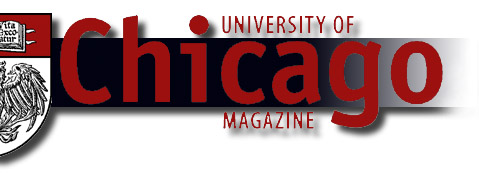|
Dino—oops!
One must agree with
W. J. T. Mitchell (“Dinos R Us,” February/98) when he says it is
impossible to take into account all the dinosaur images during their
150 years of public life. However, I must certainly object when
he says that the dinosaur image “was not part of most American children’s
experience before World War II.” This leaves out my favorite image:
Dinny, the pal of the popular comic strip caveman, Alley Oop. In
the days before television, the daily comic strip was a strong influence
on young minds.
In fact, it was through the controversy that arose over Alley Oop
that I first learned that dinosaurs and cavemen did not really live
at the same time. I still wonder.
John E. Trowbridge, DB’53
Deming, New Mexico
Originality counts…
Jessica Abel (“Chicagophile”)
is perfect. I have never enjoyed something new and original as much,
and I salute her. Can’t wait for her first book!
James T. Dillon, AM’71, PhD’78
Riverside, California
…but not in spelling
Regarding the “Chicagophile”
cartoon (February/98): “TOMMORROW”??? Perhaps you should install
a spellchecker for Ms. Abel, then insist that she use it.
Richard E. Koeneman, AB’64
Lincolnshire, Illinois
Oil and water
I enjoyed
reading Wayne Booth’s article, “Overtures,” in the February/98 issue.
As the pace of our lives seems to accelerate with each passing year,
I strongly agree that the pursuit of excellence by a devoted amateur
offers a wonderful opportunity to reduce stress, renew our minds,
and have a little fun as well. By the way, Charles Cooke, a professional
writer and aspiring dedicated “amateur” pianist, makes a similar
argument for developing a life hobby in his delightful book Playing
the Piano for Pleasure (Simon and Schuster, 1941).
One minor quibble: the introduction to Booth’s piece rhetorically
asks, “Why did Winston Churchill take up watercolors?” Actually,
he was an advocate of oil painting. In Painting as a Pastime,
Churchill writes: “‘La peinture à l’huile Est bien difficile Mais
c’est beaucoup plus beau Que la peinture à l’eau.’ “I write no word
in disparagement of water-colours,” he continues. “But there really
is nothing like oils. You have a medium at your disposal which offers
real power, if you only can find out how to use it….And always remember
you can scrape it all away.”
Edwin O. Bradley, MBA’80
Buffalo Grove, Illinois
The joy of strings
My wife and I learned
stringed instruments in our 30s, then played with a ragtag chamber
music group for 10 years. Parts of Wayne Booth’s article exactly
reflect our own experiences and feelings: “joyful friendship, spiritual
ecstasy, gratitude for life’s mysterious unearned gifts….”
The article is marvelous, and I’m sure the book will be too. Booth
has found a way of raising issues that are difficult to raise in
a meaningful and intelligible way, and that rarely get discussed
beyond a superficial level. For example, he cites Winston Churchill’s
idea that painting has value because it refreshes a person for “more
important things.” Booth is critical: “…the time Churchill spent
painting was as important, as maybe sometimes even more important
than, many of the hours he spent deciding on war strategies and
election moves.” And he quotes Chesterton: “…life exists for the
love of painting or other beautiful things.” But suppose Churchill
were to reply that he derived from the practice of politics the
very things Booth derives from the practice of playing music. There
is a tendency to feel that music, art, and other goods must be the
ends of life because they are intrinsically so good. I think that
even Booth’s view allows politics to be just as valuable as painting
or playing music.
Jack W. Meiland, AB’54, AB’56, AM’57, PhD’62
Ann Arbor, Michigan
Professionals do it for love too
Wayne C. Booth drove
me to despair with his determinedly rigid separation between “amateur”
and “professional” in “Overtures.” Of course, the implication is
that amateur is mediocre and professional is superior. Professionals
“own” music; amateurs are mere pretenders or interlopers. The two
are separated from each other by the principle of perfectionism:
Professionals are perfect; amateurs make mistakes. The world of
music is neatly divided in two.
If amateurs are doomed to mediocrity, it’s not clear why amateurs
practice music at all. Saying that they do it “for love” seems to
beg the question: Professionals don’t?
The art of music lies mortally ill, wounded by commercialism, convention,
technology, and a lack of fresh blood. Modernism made its vicious
attack and then obligingly died, leaving new music without direction
and purpose. “Professionals” keep music locked in a death grip;
composers are afraid and defensive. This is no time for the so-called
“amateur” to be timid. It is time for him or her to take music back
and say: “Music is mine. It was meant for me. I will make of it
whatever I want it to be!”
Barry B. Taxman, AM’50
Berkeley, California
Amateur ethics
Wayne Booth’s article
about amateur pursuits reminded me of Aristotle’s Nicomachean Ethics.
In ethics, it is a mystery how the action itself, rather than a
product of it, can be the end for the sake of which we act. Could
Aristotle’s answer be relevant to Booth’s question too?
Aristotle says that we act for the sake of the beautiful (or noble:
to kalon), which seems to mean that we act in order to become beautiful
ourselves. Could it be that, paradoxically, part of the worth of
amateur pursuits is that they remind us how beautiful actions can
be undertaken for their own sake, i.e., that to live a virtuously
happy life is not simply to act out of reverence for moral law but
to act nobly and beautifully? Did Churchill unfairly denigrate his
own amateur pursuit because he sensed the inferiority of painting
to the virtuous actions that constituted his task as a statesman?
Perhaps Churchill’s station as a statesman was a strained and paradoxical
one, in which the fundamentally amateurish pursuit of happiness
and virtue took on the trappings of a profession. When he reminds
us how music has worth independent of its products or effects, Booth
reminds us also of what virtue, happiness, indeed a good life, are
all about.
Jonathan B. Beere, AB’95
Princeton, New Jersey
|



